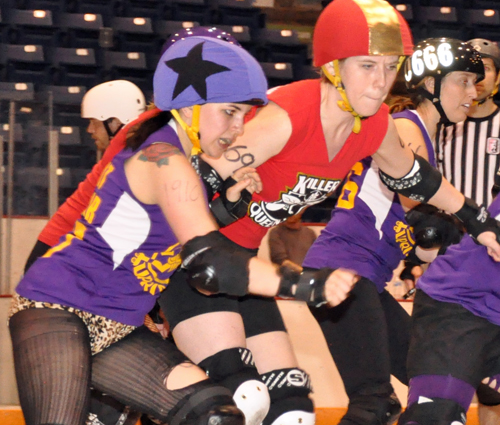
Don’t mess with Lucille Brawl. She’s a lean, mean, roller skating machine. Also known as Angela Watt, the Ontario Veterinary College (OVC) technician is one of about a dozen U of G staff and students who shed blood, sweat and occasionally tears as part of the Violet Uprising, one of three roller derby teams that make up the Royal City Rollergirls league. Their home opener on May 28 pitted them against the Killer Queens at the Sleeman Centre.
The aim of the game is for the “jammer” to force her way through a phalanx of “blockers” from the opposing team without getting knocked to the floor. With everyone skating in the same direction around a track, the jammer scores one point for every opposing blocker she skates past. But her own blockers have to clear the way. Each round lasts for up to two minutes or until the lead jammer calls it off to keep the other team’s jammer from scoring more points.
In a sport where hitting is allowed, how do you get a penalty?
“You have areas that you can hit and others you can’t hit,” says Watt. “Elbows are illegal. If you’re high hitting or low hitting, it’s illegal. You can’t hit from the back. If someone’s ahead of you, you can’t just push them out of the way.”
Despite wearing helmets, wrist guards, elbow and knee pads, the skaters still get injured. Watt rolls up her pant leg to reveal a blackened knee. Another skater shattered her ankle in a recent scrimmage. The injuries are usually minor, but paramedics are always on the scene.
“Derby girls are always black and blue, and we’re proud of our bruises,” says Watt. “It’s kind of a show-off, like ‘Look what happened to me.’”
Fans have the option of sitting in the stands or getting in on the action in the “suicide seating” section where skaters whizz by the audience with no barriers. The bigger the wipeout, the louder the cheers.
But there’s more to roller derby than smack downs.
“We get to hit people, but you have to have endurance and stamina,” says Watt’s teammate Sonia Maiorano, also known as Soni Soprano. Maiorano works in OVC’s companion animal medical complex, Watt in the health sciences centre.

Roller derby appealed to both women because of their love for sports. Inspired by her hockey-fan father, Watt has been skating since she was a kid. Maiorano heard about roller derby from someone on her soccer team and decided to give it a try. Both women joined the Violet Uprising last fall.
During the training process, skaters learn how to fall without injuring themselves. Off season, they practice two to three times a week, which increases to four times a week during the season. When they’re not on the track, they make special appearances and attend charity events.
The teams are looking for “fresh meat” this fall.
“I know it’s not for everyone,” adds Watt. “There are people who don’t even want to come to the games because they say, ‘I can’t watch you get hurt.’” But she warns that roller derby can be addictive. The skaters’ husbands are known as “derby widowers” because their wives spend so much time on the track.
“It’s a great opportunity to make new friends,” says Maiorano. “You have a large spectrum of women. Some are students, some are mothers, some are single. It doesn’t matter.” All shapes, sizes and ages are welcome, she adds.
Despite the physicality of the sport, Watt says the women develop a strong bond. A lot of people turn to derby after they’ve had something traumatic happen in their life. It’s very empowering for a woman. ”
Violet Uprising takes on Belle City Roggergirls at the Sleeman Centre on June 25, 7 p.m. The teams compete every two weeks during the summer. For more information, visit the website for Royal City Rollergirls.